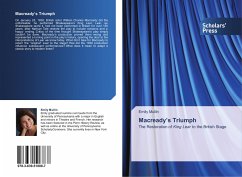On January 25, 1838, British actor William Charles Macready did the unthinkable: he performed Shakespeare's King Lear. Lear, as Shakespeare wrote it, had not been performed in Britain for over 150 years, after Nathum Tate rewrote the play to include romance and a happy ending. Critics of the time thought Shakespeare's play simply couldn't be done. Macready s production proved them wrong and represented a turning point in the play s history, opening the door to the interpretations of Lear we know today. What did it take for Macready to return the original Lear to the stage? How did the 1838 production influence subsequent performances? What does it mean to adapt a classic story to modern times?
Bitte wählen Sie Ihr Anliegen aus.
Rechnungen
Retourenschein anfordern
Bestellstatus
Storno








